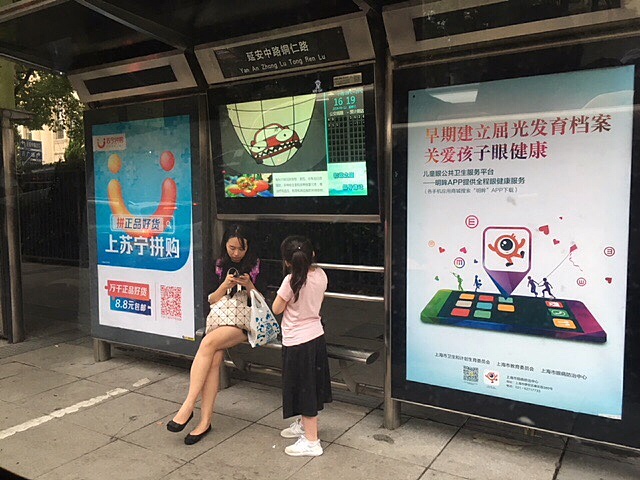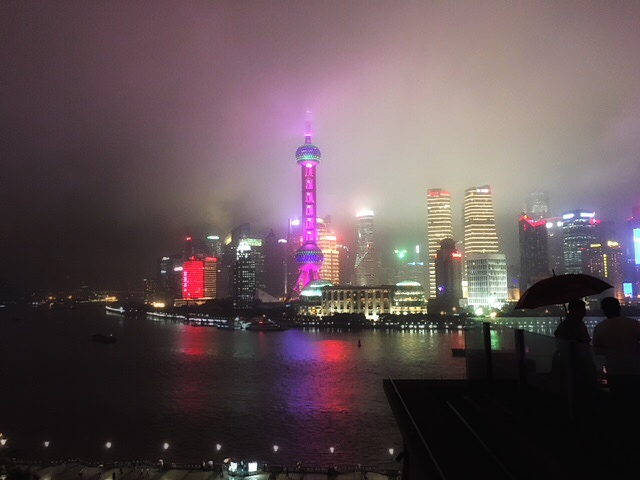12 September
Shanghai, China
Flying to the Far East is usually a disaster, sleepwise. My second night in Shanghai it was still dark when I awoke but it was 5 a.m., which meant that I had gotten six hours of sleep and would be at least minimally functional.
My room was on the 49th floor of the Jing An Shangri La Hotel, and it looked like Blade Runner outside. I went down to the gym, which stretches the entire width of the 4th floor. The Chinese national basketball team was playing on all the televisions in the gym, as it would be every morning during my stay. Today, they were playing Croatia, and they were up by eight points near the end of the first half. I did an abridged version of an Orangetheory “body weight” workout involving jumping over a bench repeatedly. These exercises always seem both harder and more ridiculous when you try to do them by yourself rather than in a room full of other people. I ran on the treadmill as it became light outside.
Around 40 of us were in Shanghai for a week of training. I joined one of my French colleagues, Serge, for breakfast. I ate local red date yogurt out of a plastic container, along with pre-sliced wedges of dragon fruit, white with black speckles, and ubiquitous that week. We talked about the differences in pedagogic philosophies between France and the US, and agreed that neither was ideal. The maître d’ at the restaurant bore a striking resemblance to Paul Manafort, and for a split second I had constructed a little narrative that Paul Manafort was here, trying to rebuild his life working in hospitality in eastern China, and I thought, “Well, maybe the guy deserves a second chance.” On the way back up to my room after breakfast, I passed a young guy from the hotel staff putting the final touches on an enormous floral display in the lobby: a border of pebbles, which clicked like dominoes as he placed them on the marble tabletop.
The hotel catering staff fell all over themselves to provide superior service all week: this included making a whole bunch of coffees in advance and lining them up on the bar. This meant that all of the coffees were lukewarm by the time I got there, but I took one anyway so as not to make anyone feel bad.
Our moderator for today’s training in the “Lifestyle” conference room was a wide-eyed American named Dan, bald and tall and lean in black jeans and a floral-print button-down shirt, looking not unlike the lead singer from Midnight Oil. Dan had been named one of the Top 25 Most Influential Management Scholars by The Academy of Management Perspectives, according to the agenda. The goal of this session was to explore our “signature strengths;” we had each taken a pre-training survey called Point Positive™, where we wrote little narratives about times we had been at our best.
My breakout group met on the 32nd floor in a regular hotel room from which the bed had been removed to improvise a temporary conference room. Each of us was to talk about our “signature strengths” as described in our Point Positive™ report. One of my American colleagues, our Head of Manufacturing Excellence, talked about how he and his family read books together, and about how he was “working a lot at being humble.”
 Tom Snow
Tom SnowAfter lunch, we were sent on “innovation visits” to different Chinese companies in Shanghai. My group was sent to visit the dialysis clinic at Renji Hospital (Grade 3, Class A). People were walking along the sidewalk and dodging the endless flow of scooters to cross the street. An older woman cradled a small, wobbly plastic bag in her hands, filled with what looked like urine. We were escorted past long lines of people corralled behind those nylon retractable barriers you see at the airport. They seemed resigned to the wait. The dialysis clinic was on the 14th floor, where we were seated in a conference room around a large table with faux-leather chairs which made sharp fart-like noises whenever anyone made the slightest movement. The head of the department, Professor Chen, a 50-ish woman whose eyebrows were painted with a hint of violet, gave a slightly weary introduction in perfect English, then she handed us over to Dr. Xie for a tour of the floor. Around 50 people were attached to dialysis machines in the main treatment room, staring at their phones or sleeping on narrow hospital beds. At the end of the hall were nicer rooms with potted plants, little privacy dividers between the beds and an ensuite waiting room; Dr. Xie explained that they were reserved for foreign patients and their family members or interpreters.
That night, a few members of our Chinese team took us to a restaurant in the French Concession called Szechuan Citizen. I had asked my colleague Hao to bring us someplace local where they might go themselves, so we could have a break from hotel restaurants which mainly cater to Western guests. There were around a dozen of us, sitting at a big round table with a lazy susan in the middle. We drank basil cocktails and pitchers of beer. Plates of food began arriving: lotus root in pepper sauce, fried corn, bok choy with garlic. Hao nudged the lazy susan with his pinkie and ring finger and we all served ourselves. It was fucking amazing. Boiled fish on a bed of birds-eye peppers, smoked duck, crab, and small black mushrooms in a savory sauce came next. To make room for the new plates, the ones already there would get nudged toward the center of the lazy susan in a kind of reverse centrifugal force.
After dinner, Weizhen from marketing led a few of us to a bar at the Bund, which runs along the river and offers striking views of the skyscrapers on the Pudong side, none of which were there 15 or so years ago. There were no free tables inside and a light mist was falling, but we sat out on the roof terrace anyway and drank Tsing Taos. I would rate my knowledge of Chinese history and culture probably a one-half step above complete ignorance, but I asked Weizhen whether she felt the presence of the Chinese state very strongly in her personal life.
“Not really,” she said.
“Well, what about the one-child policy?” I responded.
She thought for a second and replied: “Well, Shanghai might be going to a two-child policy, but, you know, even if they went to a three-child policy, people would only have one anyway. It’s too expensive here to have more than that.”
I made it back to my hotel room around half past midnight. The city outside flashed mutely like a pinball machine between games.
Tom Snow






